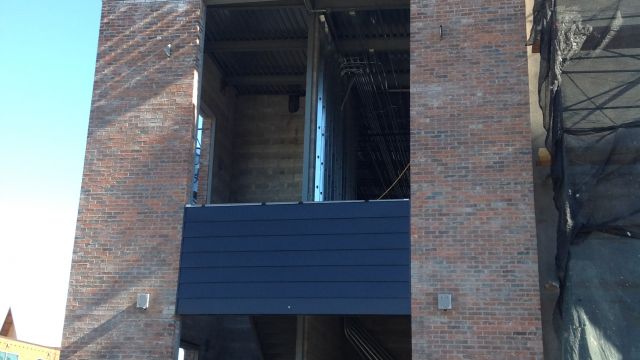Should you clean your own masonry or hire it out?
Masonry cleaning
By Ron Baer
Among major contractors, opinions are split down the middle on sub-contracting new masonry cleaning or keeping the work in-house. This is a classic make-or-buy decision regularly made by businesses. For instance, managers and owners agree you should buy some level of liability insurance and not assume all this risk. In fact, customers insist on this insurance; not making a “buy” decision is foolhardy. Many such make-or-buy decisions deserve to be re-evaluated periodically.
One make-or-buy decision contractors make involves equipment maintenance. Do you have your own shop with in-house mechanics, or do you take the equipment out to a service center? This decision is generally, but certainly not entirely, economic: deciding to have an in-house mechanic when outside maintenance expense exceeds the cost of hiring a mechanic and maintaining a shop. Economic and non-economic factors in making this decision include:
Economic factors for an in-house shop (make) include payroll and benefits for mechanic, and savings buying parts directly. Economic factors for a service center (buy) include spending for outside labor and mark-up on parts.
Non-economic factors for an in-house shop (make) include work done when needed; a jack-of-all-trades mechanic required; finding, hiring and retaining an employee; and expertise and parts inventory built over time. Non-economic factors for a service center (buy) include work delay possibilities – waiting in line; a specific, specialized technician on-hand; and a mechanic available.
If you have not done so recently, perhaps it is time to re-evaluate the make-or-buy cleaning decision. This decision has not only economic and non-economic elements, as equipment maintenance above, but also a third component: the emotions involved. Often, the emotions of this decision ultimately swing it, and so are worthy of consideration. Let’s look at factors involved in evaluating the decision about how to clean masonry.
Economic factors for in-house cleaning include payroll and benefits for personnel; expenses for chemicals, insurance, lifts and equipment; and profit from cleaning. Economic factors for sub-contract cleaning include spending for cleaning including personnel, chemicals, insurance, lifts, etc.; cleaning at fixed, inclusive cost; and expense for cleaning.
When you are considering economic factors, it is important to assume in-house cleaners may not have the same productivity as a cleaning contractor. For most cleaning contractors, labor is cheap, while equipment is expensive. As a result, contractors tend to minimally invest in equipment, compensating for low productivity with extra manpower.
Compare, for instance, a sub-contractor using a wheel barrow instead of a Bobcat. An operator costs significantly more than basic labor, but will accomplish 10-times the work. As a business-minded contractor, it is imperative that you supply people with the equipment needed to get jobs done properly, quickly and profitably. Therefore, the factors in a decision to outsource cleaning or accomplish it in-house deserve careful consideration.
Non-economic factors include reliance on others' availability; jobs completed on schedule – revenue accelerated; knowledge of materials and conditions; dependence on one-size-fits-all methods; finding, hiring, training and retaining; avoidance of employment responsibilities, control employee; and responsibility and quality control directly maintained.
Emotional factors include tradition: It’s the way we've always done it; operational comfort: one less sub to worry about; and employee resistance: No one here wants to clean.
If it's been more than a year since you decided whether to clean your own work or hire a subcontractor to do it, economic and business conditions have changed. It's worthwhile to evaluate the economic factors, the non-economic and emotional factors involved to determine if change is in order.
Case and point
Larry Bonife, owner and president of Cornerstone Masonry Inc. in Vancouver, Wash., was faced with reviewing his cleaning operation, when his long-time cleaning contractor sold his business. The new cleaner was not delivering the quality Bonife demanded as he is highly invested in the quality of cleaning on his projects.“I compete on the basis of the quality of our work,” Bonife says. “Nothing displays the quality of the job better than the cleaning. The masonry needs to ‘pop,’ to shine, and to reflect light. I needed to get our cleaning back to the quality our customers were accustomed to.”
Bonife, having tried in-house cleaning and not been satisfied with the result, found a young man who wanted to start a cleaning company. However, Cornerstone Masonry still was not satisfied with the results from the new company. Bonife decided that, to insure quality, he needed to assist the contractor in acquiring the best available cleaning equipment. He arranged for his contractor to buy a Kem-O-Kleen masonry cleaning machine.
With the new machine, Bonife is getting the pristine cleaning results he demands. He has incentivized his contractor, paying a 20 percent bonus when the job meets Bonife’s high standards. Further justifying Bonife's demanding standards, the high-quality cleaning won a job for Cornerstone Masonry when they were not the low bidder.
Bonife knows that he has more leverage with an independent contractor, less liability exposure, and can attract a more reliable person to clean when that person wants to be a business owner, rather than an employee. Bonife is willing to give up some short-term profit for these long-term, bottom-line benefits.
“To be the first choice contractor, you have to be better,” says Bonife, "and pristine cleaning is how we demonstrate we are better.”
About the Author
Ronald Baer is President of Unique Industries, Inc., manufacturer of Kem-O-Kleen masonry cleaning equipment, and Enterprise Consulting of Colorado, Inc., a consulting firm providing management services to family-owned businesses. He is also a facilitator for The Alternative Board (TAB). He may be reached at 800-274-4121.
Photo courtesy of Dan Johnson, D/C Power Washing & Restoration, Vancouver, Wash.



















